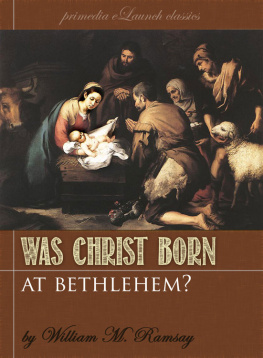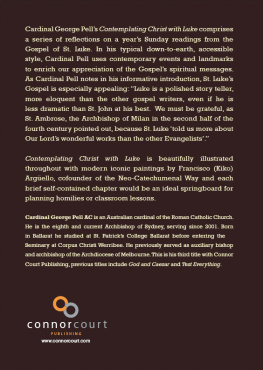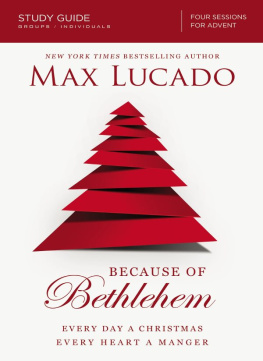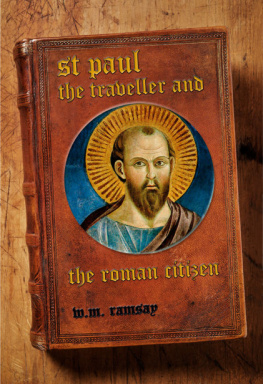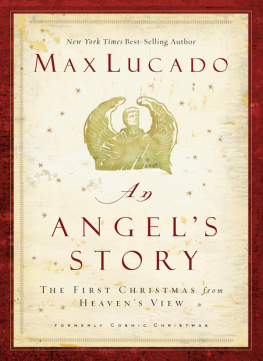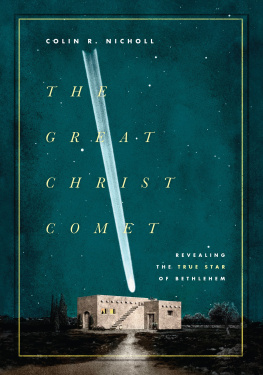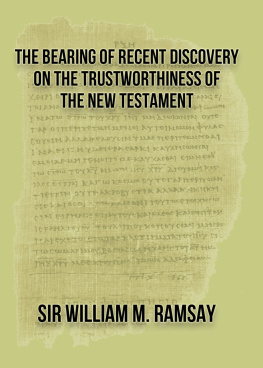Sir William Mitchell Ramsay - Was Christ born at Bethlehem? : a study on the credibility of St. Luke
Here you can read online Sir William Mitchell Ramsay - Was Christ born at Bethlehem? : a study on the credibility of St. Luke full text of the book (entire story) in english for free. Download pdf and epub, get meaning, cover and reviews about this ebook. City: London, year: 1898, publisher: Hodder and Stoughton, genre: Religion. Description of the work, (preface) as well as reviews are available. Best literature library LitArk.com created for fans of good reading and offers a wide selection of genres:
Romance novel
Science fiction
Adventure
Detective
Science
History
Home and family
Prose
Art
Politics
Computer
Non-fiction
Religion
Business
Children
Humor
Choose a favorite category and find really read worthwhile books. Enjoy immersion in the world of imagination, feel the emotions of the characters or learn something new for yourself, make an fascinating discovery.
- Book:Was Christ born at Bethlehem? : a study on the credibility of St. Luke
- Author:
- Publisher:Hodder and Stoughton
- Genre:
- Year:1898
- City:London
- Rating:4 / 5
- Favourites:Add to favourites
- Your mark:
- 80
- 1
- 2
- 3
- 4
- 5
Was Christ born at Bethlehem? : a study on the credibility of St. Luke: summary, description and annotation
We offer to read an annotation, description, summary or preface (depends on what the author of the book "Was Christ born at Bethlehem? : a study on the credibility of St. Luke" wrote himself). If you haven't found the necessary information about the book — write in the comments, we will try to find it.
Was Christ born at Bethlehem? : a study on the credibility of St. Luke — read online for free the complete book (whole text) full work
Below is the text of the book, divided by pages. System saving the place of the last page read, allows you to conveniently read the book "Was Christ born at Bethlehem? : a study on the credibility of St. Luke" online for free, without having to search again every time where you left off. Put a bookmark, and you can go to the page where you finished reading at any time.
Font size:
Interval:
Bookmark:
Was Christ Born at Bethlehem?
A Study on the Credibility of St. Luke
By Sir William Mitchell Ramsay
UNDERSTANDING that a certaincriticism implied a sort of challenge to apply my theory of Luke's character asa historian to the Gospel, I took what is generally acknowledged to be the mostdoubtful passage, from the historian's view, in the New Testament, Luke 2:1-4. Manywould not even call it doubtful. Strauss (in his New Life of Jesus) and Renandismiss it in a short footnote as unworthy even of mention in the text.
This passage, interpretedaccording to the view which I have maintained that Luke was a great historian,and that he appreciated the force of the Greek superlative (in spite of thecontradiction of Professor Blass and others) gave the result that Luke wasacquainted with a system of Periodic Enrollments in Syria, and probably in theEast generally. I looked for evidence of such a system; and it was offered byrecent discoveries in Egypt. The confirmation afforded to Luke was explained inthe Expositor, April and June, 1897. Realizing better in subsequent thought thebearings of the Egyptian discovery, I have enlarged these two articles into anargument against the view that Luke sinks, in the accessories of his narrative,below the standard exacted from ordinary historians. At the risk of repeatingviews already stated in previous works, the second chapter attempts to putclearly the present state of the question as regards the two books of Luke,without expecting others to be familiar with my views already published.
The names of those scholars whoseviews I contend against are hardly ever mentioned. The scholars of the"destructive" school seem to prefer not to be mentioned, when onediffers from them. I have learned much from them; I was once guided by them; Ibelieve that the right understanding of the New Testament has been very greatlyadvanced by their laudable determination to probe and to understand everything,as is stated on p. 33; but I think their conclusions are to a great extenterroneous. It might, however, be considered disingenuous if I concealed thatthe weighty authority of Gardthausen, the historian of Augustus, is deadagainst me, p. 102.
My best thanks are due toProfessor Paterson, who has discussed many points and cleared up my views inmany ways; to Mr. B. P. Grenfell, who read the first proof of chapter 7, andenabled me to strengthen it; and, at last, to Mr. F. G. Kenyon; to Mr. A. C.Hunt; to Mr. Vernon Bartlett; and to Mr. A. Souter.
The language of the book hasprofited much by my wife's care in revision.
It would be impossible and onlywearisome to the reader if it were possible to trace the origin of everythought expressed in the following pages. Where I was conscious, at the momentof writing, that I was using an idea suggested by another, I have said so; butas regards the New Testament, one learns in the course of years so much from somany sources that one knows not who is the teacher in each detail.
The relation between the almostidentical solutions of the Quirinius difficulty, proposed nearly simultaneouslyby M. R. S. Bour and myself, is explained in chapter 11.
W. M. RAMSAY.
POSTSCRIPT. I hear, Oct. 2, that Messrs. Grenfell and Hunt have found ahousehold-enrollment paper a little older than A.D. 50. The date is lost, butthe same officials are mentioned in it as in a document of the 6th year of[Tiberius], where the names of Claudius and Caligula are impossible. Hence thepaper belongs to the census of A.D. 20, and proves conclusively my theory as tothe origin of the Periodic Enrollments from Augustus. Much of the argument inchapter 7, printed when the Periodic Enrollments were traced with certaintyonly as far back as A.D. 92, is now confirmed so completely, that part of it ishardly necessary.
AMONG the writings which arecollected in the New Testament, there is included a History of the life ofChrist and of the first steps in the diffusion of his teaching through theRoman world, composed in two books. These two books have been separated fromone another as if they were different works, and are ordinarily called"The Gospel according to Luke" and "The Acts of theApostles". It is, however, certain from their language, and it is admittedby every scholar, that the two books were composed by a single author as partsof a single historical work on. a uniform plan. After a period of independentexistence, this History in two books was incorporated in the Canon, and itsunity was broken up: the first book was placed among the group of four Gospels,and the second was left apart.
Professor Blass has pointed out atrace of this original independent existence in the famous manuscript which waspresented by the Reformer Beza to the University of Cambridge. In that manuscriptthe name of John is spelt in two different ways, the form Joanes being almostinvariably used in Luke and Acts, and Joannes in the Gospels of Matthew, Markand John. Thatslight difference in orthography leads us back to the time of some old copyist,who used as his authority a manuscript of the History of Luke, in which thespelling Joanes was employed, and different manuscripts of the other Gospelscontaining the spelling Joannes. Probably the spelling Joanes was that employedby the original author; and it is adopted in Westcott and Hort's editionthroughout the New Testament, except in Acts 4:6 and Revelation 22:8.
This historical work in two booksis attributed by tradition to Luke, the companion and pupil of Paul. We are nothere concerned with that tradition. Since all scholars are agreed that the sameauthor wrote both books, we shall use the traditional name to indicate himmerely for the sake of brevity, as it is necessary to have some name by whichto designate the author; but we shall found no argument upon the authorship. LikeProfessor Blass, I see no reason to doubt the tradition; but those who do notaccept the tradition may treat the name Luke in these pages as a mere sign toindicate the author, whoever he may be.
The point with which we are herespecially concerned is the trustworthiness of this author as a historian. Manyfacts are recorded by him alone, and it is a serious question whether or notthey can be accepted on his sole authority.
This is a subject on which thereprevails a good deal of misapprehension and even confusion of thought. Thereare many who seem to think that they show fairness of mind by admitting thatLuke has erred in this point or in that, while they still cling to their beliefin other things, which he and he alone, records, on the ground that in thosecases there is no clear evidence against him. But it must be said that this wayof reasoning is really mistaken and unjustifiable: it refuses to make theinference that necessarily follows from the first admission.
While human nature is fallible,and any man may make a slip in some unimportant detail, it is absolutelynecessary to demand inexorably from a real historian accuracy in the essentialand critical facts. We may pardon an occasional instance of bias or prejudice;for who is wholly free from it? But we cannot pardon any positive blunder inthe really important points. If a historian is convicted of error in such avital point, he ceases to be trustworthy on his own account; and everystatement that he makes must gain credit from testimony external to him, orfrom general reasons and arguments, before we accept it. Especially must thisbe the case with the ancient historians, who as a rule hide their authoritiesand leave us in the dark as to the reasons and evidence that guided them toformulate their statements. There may be there always are many facts whichthe poorest chronicler records correctly; but we accept each of these, notbecause of the recorder's accurate and sound judgment in selecting his facts,but because of other reasons external to him. If there is in such a historianany statement that is neither supported nor contradicted by external evidence,it remains uncertain and is treated as possibly true, but it shares in thesuspicion roused by the one serious blunder.
Next pageFont size:
Interval:
Bookmark:
Similar books «Was Christ born at Bethlehem? : a study on the credibility of St. Luke»
Look at similar books to Was Christ born at Bethlehem? : a study on the credibility of St. Luke. We have selected literature similar in name and meaning in the hope of providing readers with more options to find new, interesting, not yet read works.
Discussion, reviews of the book Was Christ born at Bethlehem? : a study on the credibility of St. Luke and just readers' own opinions. Leave your comments, write what you think about the work, its meaning or the main characters. Specify what exactly you liked and what you didn't like, and why you think so.

